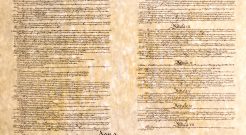When the Constitution was written and ratified there was no free-floating principle of sovereign immunity, but now the Supreme Court has recognized one.
Reminding Thomas: Ilya Somin on Clarence Thomas and "We the People"
In this post at Volokh, Ilya Somin challenges Justice Clarence Thomas’ recent remarks that “We the People” in the Preamble of the Constitution did not include African-Americans when it was ratified in 1787. The history is much more complex and interesting than many know, obscured as it has been owing to Chief Justice Roger Taney’s majority opinion in Dred Scott, which articulated that both the Declaration of Independence and the Constitution never recognized the rights of blacks who, in Taney’s formulation, “had no rights which the white man was bound to respect.” Part of his conclusive proof was that the Founders had not immediately abolished slavery and placed blacks on the same level of citizenship as whites. Of course, this assumes that they had such a power of abolition in the first place either at the time of the Declaration or when the Constitution was ratified. Moreover, all whites were not even placed on the same level of civic equality at these moments.Today, Taney’s opinion is frequently given as evidence in law schools of the dastardly results that come from originalist jurisprudence. This was certainly the pedagogy I received.
Somin reminds us that it was Justice Benjamin Curtis’ dissenting opinion in Dred Scott that was more historically accurate. He noted that “at least five states at the time of the Founding allowed free blacks to become citizens on the same terms as whites.” Moreover, they were also given the right to participate in the elections that determined the delegates to the state conventions that would be charged with either voting up or voting down the proposed Constitution. Justice Curtis observed the following:
It has been often asserted that the Constitution was made exclusively by and for the white race… [But I]n five of the thirteen original States, colored persons then possessed the elective franchise, and were among those by whom the Constitution was ordained and established. If so, it is not true, in point of fact, that the Constitution was made exclusively by the white race. And that it was made exclusively for the white race is, in my opinion, not only an assumption not warranted by anything in the Constitution, but contradicted by its opening declaration that it was ordained and established by the people of the United States, for themselves and their posterity. And as free colored persons were then citizens of at least five States, and so in every sense part of the people of the United States, they were among those for whom and whose posterity the Constitution was ordained and established.
Additional links:

